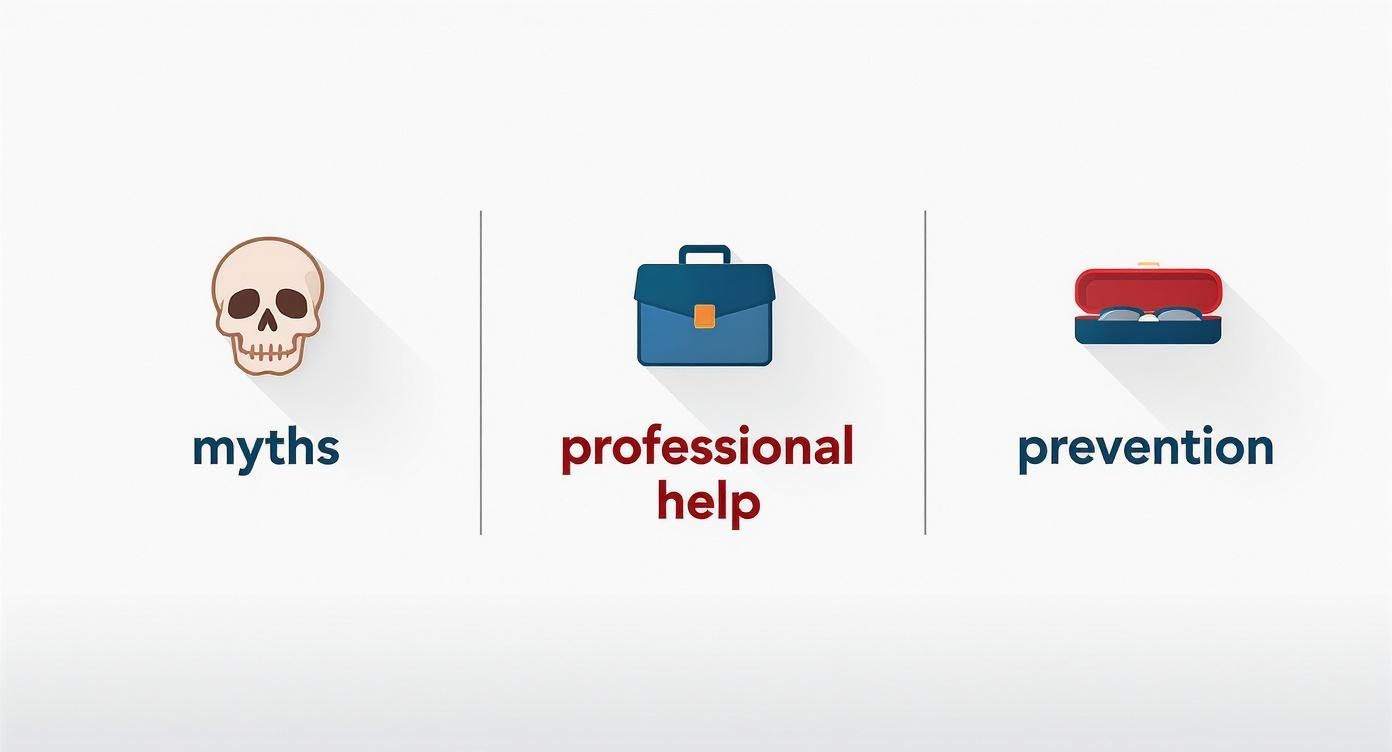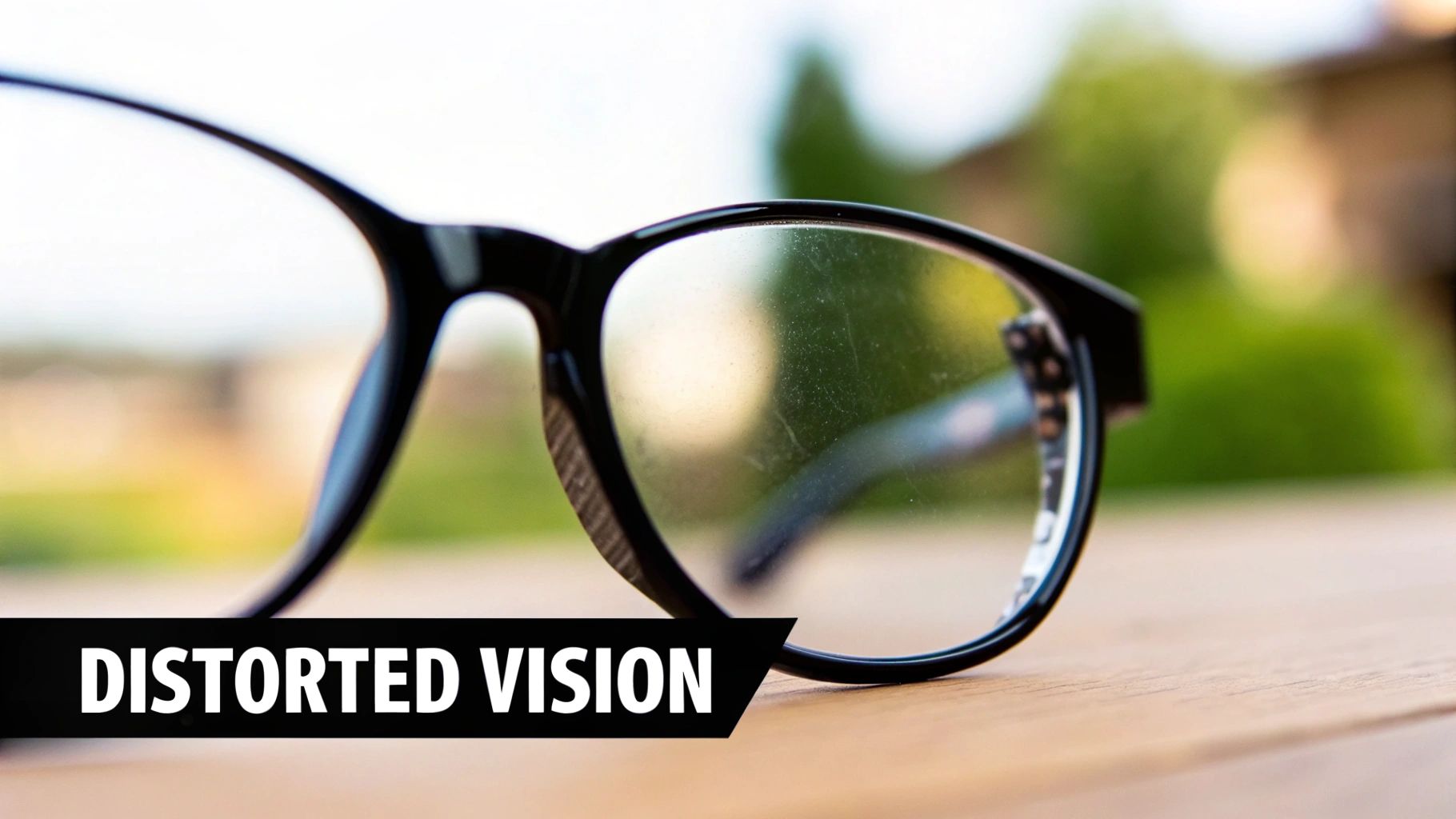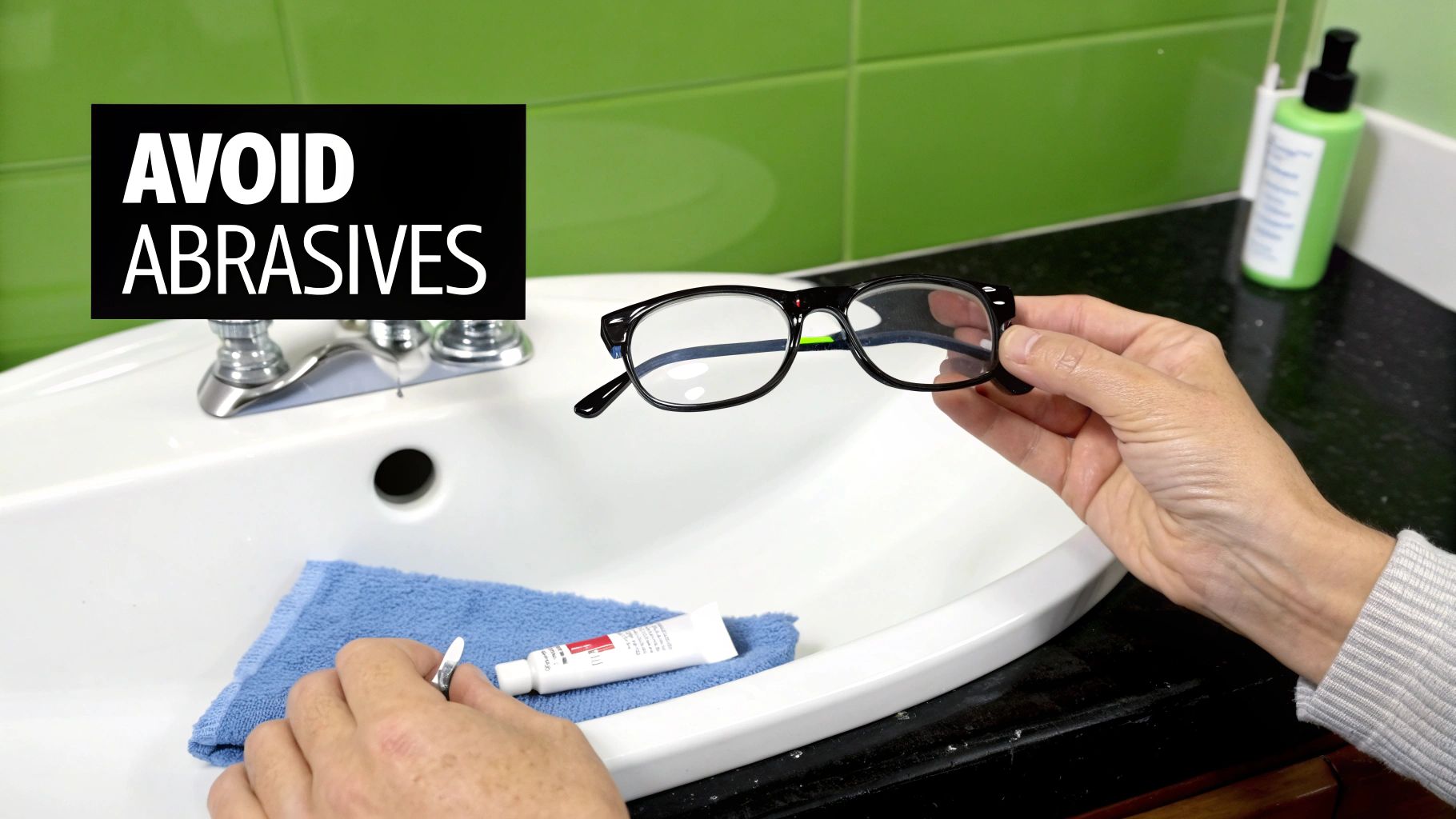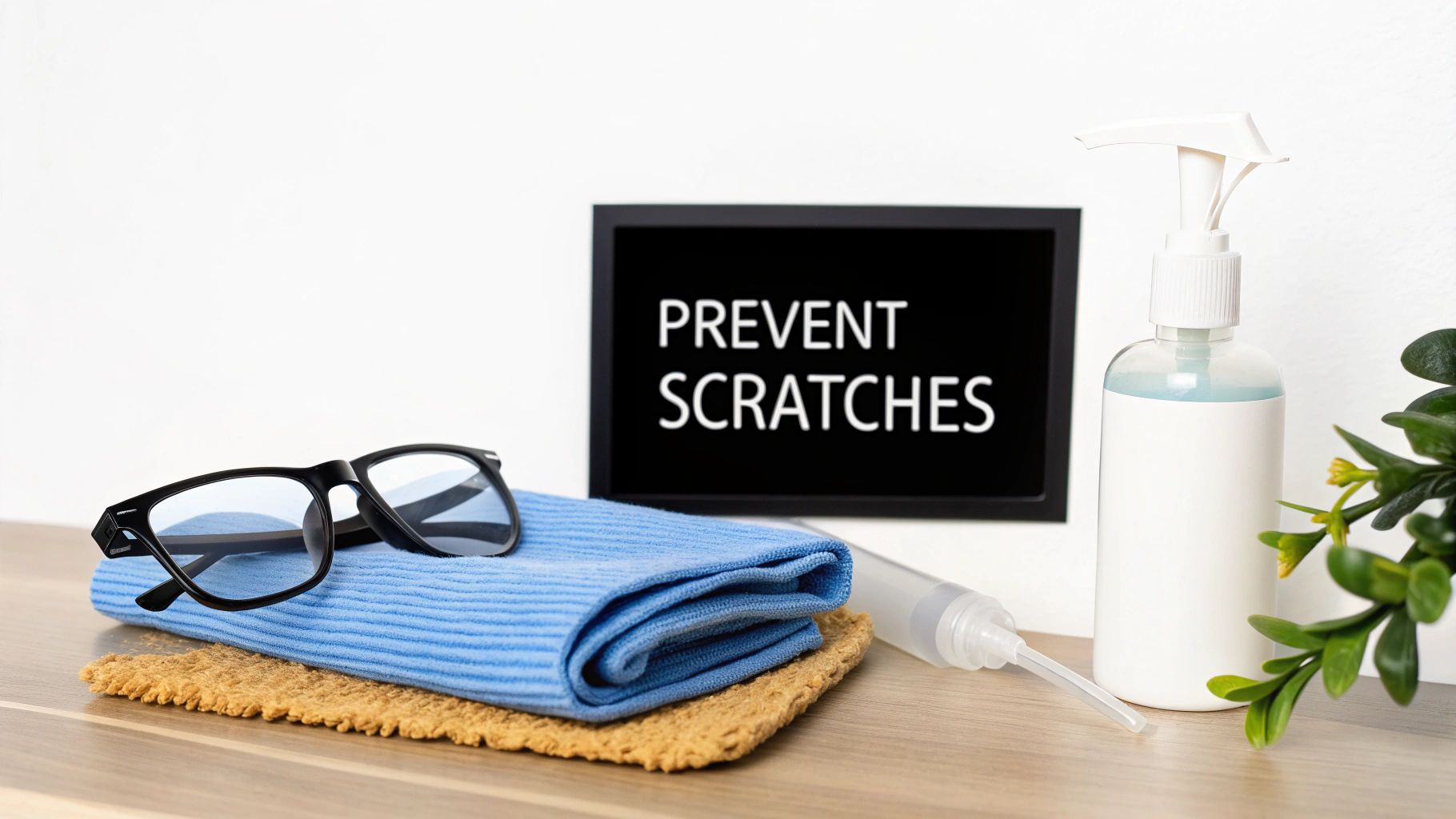That sinking feeling when you spot the first scratch on a new pair of glasses is all too familiar. But it’s more than just a cosmetic annoyance; figuring out how you can get scratches out of eyeglasses is actually crucial for your eye health and safety. Even minor scuffs can distort your vision, forcing your eyes to work harder and leading to serious eye strain and headaches.
Why Scratched Lenses Are a Health Concern
Think of a scratch on your lens not just as a mark, but as a tiny roadblock for light. A perfectly smooth lens directs light cleanly to your eye, giving you crisp vision. A scratch, however, scatters that light, creating visual chaos in the form of glare, halos around lights, and a general fuzziness. This is particularly dangerous when driving at night, as the glare from oncoming headlights can temporarily blind you.
To compensate, your eyes have to work overtime to focus, which can quickly lead to fatigue and nagging headaches. It's a common misconception that modern lenses with all their fancy coatings are indestructible. The reality is, everyday things like a quick wipe with your t-shirt or an accidental drop can easily leave their mark. Damaging these coatings doesn't just affect clarity; it can also remove the built-in UV protection, leaving your eyes more vulnerable to harmful sun exposure.
The Reality of Scratched Lenses in Australia
You might be surprised how widespread this eye health issue is. Research from Safety Solutions Australia uncovered a telling statistic: a staggering 61% of Australians admit to wearing glasses with scratched lenses. Even more concerning, 45% are looking through lenses that actively obscure their vision. This shows that many of us are putting up with subpar vision without realising the potential impact on our eye safety. You can learn more about the study's findings on eyeglass safety here.
Key Takeaway: Dealing with scratched lenses isn't just about appearances. It's about protecting your vision, preventing unnecessary eye strain, and ensuring you can see clearly and safely throughout your day.
Before you reach for the toothpaste or baking soda, it’s vital to understand what works and what can cause irreparable damage to your eye health. Here's a quick rundown of the most common methods people try.
Quick Guide to Scratched Lens Solutions
| Method Type | Potential Effectiveness | Risk to Lenses & Coatings | Recommendation |
|---|---|---|---|
| DIY Home Remedies | Very Low to None | Extremely High. Can strip essential UV and anti-glare coatings, creating more visual distortion. | Strongly Not Recommended. Avoid toothpaste, baking soda, and waxes to protect your eye safety. |
| Commercial Scratch Kits | Low | High. Often abrasive and can damage anti-glare or UV coatings, leading to increased eye strain. | Not Recommended. The risk of damaging expensive, protective coatings outweighs the small chance of success. |
| Professional Buffing | Moderate (for plastic) | Moderate to High. Can alter the prescription and remove essential coatings, compromising visual acuity. | Use with Extreme Caution. Only an option for minor surface scuffs on basic plastic lenses, but generally not advised. |
| Lens Replacement | High | None | The Only Safe & Effective Solution. This guarantees clear, healthy vision and preserves your frame. |
As the table shows, most DIY "hacks" do more harm than good for your eyes. The safest bet is always professional advice or lens replacement.

Ultimately, the best approach is prevention, but when scratches happen, professional help is the most reliable path forward. At Prescript Glasses, we can assess the damage and explore your options. If a replacement is needed, we can customise an eyewear package to suit your requirements, getting you back to seeing the world clearly and safely.
DIY 'Fixes' That Can Permanently Damage Your Lenses

When you notice a frustrating scratch on your glasses, it's tempting to jump online and find a quick fix. But before you reach for something in your bathroom cabinet, you need to know that most of these internet-famous DIY methods will cause irreversible damage. Understanding this is the first real step in learning how you can get scratches out of eyeglasses without compromising your eye health.
Many people fall for the old wives’ tales involving common household items. Abrasive solutions, like those found in common toothpaste hacks for cleaning, are particularly bad news for your lenses. The same grit that polishes your teeth will strip away the delicate, essential coatings on your glasses.
Those coatings aren't just for looks. They're engineered to protect your eyes, providing vital defence against UV rays and cutting down on glare from screens and headlights. Wiping away these layers with a DIY 'fix' is a direct threat to your eye safety and completely compromises the integrity of your eyewear.
Why Toothpaste and Baking Soda Are a Terrible Idea
Toothpaste, baking soda, and even car wax are the usual suspects you’ll see recommended online. The logic seems plausible enough: they grind down the lens surface around the scratch to make it all one level. In reality, it’s a destructive process that creates a much bigger, permanent problem for your vision.
Instead of fixing the original scratch, you’re actually creating thousands of new micro-scratches. This leads to a permanent, hazy blur right in your line of sight, making your vision far worse than it was with the single scratch.
A Practical Example: Imagine driving at night. A single scratch might cause a distracting starburst effect around an oncoming car's headlights. After "fixing" it with toothpaste, that entire section of your lens is now a cloudy mess. Instead of one starburst, the entire headlight becomes a blinding, hazy glare, severely impairing your ability to see the road safely.
These DIY attempts permanently wreck your lenses. Once the anti-glare coating is stripped, you'll find night driving more difficult and fatiguing. If the UV coating is damaged, you’re exposing your eyes to harmful radiation every time you step outside.
Ultimately, trying these home remedies is a fast track to needing a costly full lens replacement. Protecting your vision starts with protecting your lenses from these damaging myths.
When to Trust a Professional With Your Eyeglasses

After trying a few home remedies, it quickly becomes clear that for anything more than a tiny surface scuff, you’re better off leaving it to the pros. Handing your scratched glasses over to an optical professional isn’t just about fixing a cosmetic issue—it’s about protecting your investment and, most importantly, your eyesight.
A question we hear all the time is, "Can't you just polish the scratches out?" It's a fair question, but unfortunately, it's based on a common misconception. Polishing a lens means physically removing a layer of the material. Doing so inevitably changes the precise, carefully crafted curvature that matches your unique prescription.
Even a tiny alteration can distort your vision, leading to eye strain, headaches, and blurriness. It essentially ruins the very thing your glasses are meant to do: help you see clearly and safely.
In Australia, where scratch-resistant coatings are standard, professionals strongly advise against attempting to buff or polish lenses. The consensus is clear: it's virtually impossible to polish a spectacle lens to remove a scratch without affecting its optical power. That’s why lens replacement is always the recommended and safest solution for your eye health.
The Real Professional Solution
When you bring scratched glasses to an optometrist, the safest and most reliable solution they will almost always recommend is a lens replacement. This might sound drastic, but it's the only way to be absolutely certain your vision is being corrected accurately and without compromise. Gambling with your eye health just isn't worth it.
Before you start worrying about the cost, have a look at your warranty. Many eyewear providers include protections that may cover premature wear on coatings or certain types of lens damage. An optical professional can help you figure out if your warranty applies or find a cost-effective replacement option that works for you.
Getting an expert to properly assess the damage is key. They'll ensure your new lenses are perfect for your prescription, giving you that crisp, clear vision you need. It’s also a good opportunity for a check-up; if it's been a while, booking an eye check-up ensures your prescription is up to date before you invest in new lenses.
If new lenses are the right path for you, we can customise an eyewear package to suit your requirements, making sure you get a perfect fit for both your frames and your vision.
How to Prevent Scratches on Your Glasses
While it’s tempting to look for a quick fix for existing damage, the best way to deal with scratches is to stop them from ever happening. Trust me, adopting a few simple daily habits is far easier than trying to buff out a scratch later, and it's the most effective way to protect your investment and keep your vision crystal clear.
One of the most common culprits behind those tiny, annoying micro-scratches is improper cleaning. We’ve all done it—grabbed the corner of a t-shirt or a paper towel for a quick wipe. It seems harmless, but those materials have rough fibres that trap dust and debris, effectively turning them into fine-grit sandpaper for your lenses. Over time, this small habit is a major cause of lens damage and visual discomfort.
So, what's the right way to clean your glasses? First, always rinse them under lukewarm water to wash away any loose grit. After that, add a tiny drop of lotion-free dish soap or a dedicated lens spray, and gently dry them with a clean microfibre cloth. This simple two-step process ensures you’re lifting dirt off the lens, not just grinding it in.
Smart Storage for Lasting Lenses
How you store your glasses is just as crucial as how you clean them. Tossing them onto a desk, into a bag with your keys, or leaving them on the bathroom counter is just asking for trouble and risks damaging your vision correction tool.
A Practical Example: A common habit is putting glasses in a shirt pocket. When you bend over, they can easily fall onto a hard surface like concrete, causing a deep, irreparable scratch right in your line of sight. Always using a case prevents this common accident.
When your glasses aren't on your face, their safest home is inside a hard-shell case. This is your best line of defence against drops, pressure, and accidental scrapes from other objects. If you need something even more durable, you can check out specialised eyewear protection to keep your frames and lenses safe.
Simple actions really do have a big impact. For example, leaving your glasses on the car dashboard is a big no-no, as the intense heat can cause lens coatings to warp or craze. Keeping them in their case protects them from both physical scratches and environmental damage. We know life happens, but starting with the right gear helps immensely. That's why we can customise an eyewear package to suit your requirements, making sure you get the most durable options for your lifestyle right from the start.
Choosing Durable Lenses for Your Lifestyle

Often, the best way to deal with the question of how can you get scratches out of eyeglasses is to prevent them in the first place. That journey starts with picking the right lenses for your life, which is a key decision for your long-term eye health and safety.
Truth is, not all lens materials are made equal. Your lifestyle really dictates what will hold up best over time. For example, standard plastic lenses are nice and light, but they're also much more likely to pick up scratches from daily use.
If you have a hands-on job, play sports, or just generally lead an active life, it’s a smart move to upgrade to something a bit tougher. Polycarbonate and Trivex lenses are miles ahead in terms of impact resistance and durability. They’re an excellent choice for adults and especially for kids, who tend to put their glasses through the wringer. A practical example would be choosing polycarbonate lenses for a child's sports glasses to protect their eyes from impact during a game.
Investing in Premium Lens Coatings
Beyond the material itself, one of the best investments you can make for your new glasses is a high-quality, multi-layered anti-scratch coating. Let’s be realistic—no lens is completely scratch-proof. But these advanced coatings add a hardened surface that gives you far better protection against the knocks and scrapes of daily life.
That small extra cost upfront can save you a lot of frustration and money on premature lens replacements down the line. It's worth taking a moment to explore the various clear optical lens options with protective coatings to see what fits your needs.
Even with the best tech, scratches can happen. That's why some Australian retailers, like The Optical Superstore, back their products with solid warranties. A 2-year warranty on premium lens coatings, for instance, acts as a valuable form of consumer protection. To get a better idea of how these work, you can discover more insights about their consumer protection measures.
This just goes to show how important it is to consider not just the lenses, but also the aftercare and support you'll receive. Protecting your vision starts with making a well-informed choice right from the moment you buy. By understanding all your options, we can customise an eyewear package to suit your requirements, making sure you walk away with durable, clear, and safe vision.
Common Questions About Scratched Eyeglasses
Even when you're careful, scratches can happen. When they do, a lot of questions pop up. Getting the right answers is key to making smart choices for your glasses and, more importantly, your eye health. Let's tackle some of the most common queries we hear.
Can Optometrists Buff Out Scratches?
It's one of those persistent myths you hear all the time—that an optometrist can just polish or buff a scratch right out of your lens. The reality is, they can't, and for a very good reason: it’s simply not safe for your vision.
Buffing a lens means grinding away part of its surface. This doesn't just remove the scratch; it fundamentally changes the curvature of the lens in that spot, completely distorting your prescription.
This process compromises the precise optical correction your eyes need, leading to blurred vision and eye strain. To ensure your vision is accurate and safe, any noticeable scratch warrants a lens replacement, not a risky buffing attempt.
Are Scratch-Proof Lenses a Real Thing?
The term "scratch-proof" is a bit of an overstatement. Let's be honest, no lens is truly indestructible. What you're actually getting with high-quality lenses are advanced scratch-resistant coatings.
Think of these coatings as a strong, hardened shield for your lenses. They do a fantastic job of boosting durability against everyday wear and tear. A brush against your t-shirt is unlikely to cause any harm, but dropping them on pavement or tossing them in a bag with your keys can still leave a mark. These coatings are a crucial preventative measure for eye safety, not a guarantee of total immunity.
Why Does a Tiny Scratch Cause So Much Blurriness?
It seems crazy that something so small can have such a big impact, right? Your eyeglass lenses have one job: to bend and focus light perfectly onto your retina. A scratch, no matter how small, throws a spanner in the works.
That little groove creates an uneven surface. Instead of light passing through cleanly, it hits the scratch and scatters in all directions. This light-scattering effect is what reduces sharpness and creates that frustrating glare or halos you see, especially around lights at night. Your eyes then have to work overtime to try and focus through the distortion, which is what causes that blurry feeling and leads to headaches and fatigue, impacting your overall eye health.
At Prescript Glasses, your vision and safety are our top priorities. If you're dealing with scratched lenses or want to explore more durable options for your next pair, we can help. We can customise an eyewear package to suit your requirements, ensuring you get the perfect combination of clarity, durability, and style.

